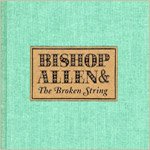There are a select few elements on Bishop Allen’s latest, The Broken String, which might convince listeners that this collection of blissful tunes is anything but a slight disappointment. Brooklyn-based songsmiths Justin Rice and Christian Rudder have culled together their talents and written some fine pop songs. The arrangements are full of nuance and are pleasantly varied. Production is tops, the harmonies crystal clear. And a band that’s shown too much promise is finally allowed their time to shine. So where does this disappointment sprout from? And why is this reviewer about to rag on a band he only wishes to see succeed? (He’s just a rotten apple, if you ask me).
This part gets painful to relate, but: The Broken String, when contrasted against 2003’s self-released debut Charm School, is a large step-up in sophistication and elegance from a band once used to cranking out energetic power pop like it was a fun chore. Regardless, being a tried and true fan of the band, it’s become impossible to glaze over the fact that this new record has a substantial number of problems weighing it down.
For instance, 10 out the 12 songs saw the light of day just last year. The band’s summation of 2006 in monthly EP releases was a project covered with admiration in the media (regrettably, not widely enough). The daunting effort was complete a few nods, back pattings, and 44 new songs later. It turned out that 2006 was the year of Bishop Allen and few knew it. So along comes a contract with Secretly Canadian’s offshoot Dead Oceans, and suddenly the band has some money and studio time to properly initiate the public into their sphere of influence. In this case, the band doesn’t stray too far out into uncharted waters to highlight their attributes, instead whittling down the EP project’s cream of the crop into a suitable offering. Rice, Rudder, and their myriad accomplices spend some time re-imagining and re-recording said crop into the basis of their first label released full-length. And ay, there’s the rub: the songs were immediately more enjoyable in their original incarnations.
A song like “The Monitor” suffers greatly from the loss of its key instrumental hook. The sad electric guitar that served as its backbone on the March EP is rendered nearly invisible on the new recording, only popping up faintly during the revised chorus. The same revised chorus where the hand-clapping fun of the original is replaced with a swell of cymbal crashes that ultimately doesn’t build up to much. On the flip side, too much is added to the beautifully lonely “Flight 180,” making it a bit too big for its britches with some grand orchestral aspirations. Less was more with the first “Flight 180” and its lone violin, the new version failing to recapture the same heights with its clutter of instruments. It’s great that the band has the friends and funds to expand their sound to such lengths, but just because they can doesn’t always mean they should. That’s science.
Some weaker tracks could have been dispelled for others (how about “Like Castanets” and “Shrinking Violet” for “The Same Fire” and “The History of Excuses”?), but it’s a minor complaint to rake the album over the coals for. A few wonderful songs couldn’t be hindered by the new arrangements, including the peachy as pie “Click, Click, Click, Click” and the musical yarn “Corazon”, which serve as the story behind the titular piano whose discovery inspired most of these songs. “Rain” (which showed up as “The Flood” on the August EP’s live show recording) is pitch perfect, a rambling and stuttering joyride that recalls the band’s early years while still showing signs of progress. Speaking of recalls, “Middle Management” is the epitome of a throwback. A much older song in Bishop Allen’s history, it’s power pop in the finest essence and totally out of place on this album, as solidly enjoyable as it may be.
As a first experience with the band, some listeners will find a lot to like about Bishop Allen in The Broken String. The right moves are there, after all. While it’s not a foregone conclusion that this newfound distribution will open up vast arrays of doors for the band, hope can be maintained that the record introduces them to the wider audience they’ve been clamoring for. Longer listeners will be impressed with the band’s evolution but will inevitably be let down with the lack of charm in these new recordings as opposed to their looser demo cuts. In the end, we see that month after month of hits produced a year-spanning compilation of songs that have forgotten their way. Shocking, as here we were thinking these boys were graduates of the Charm School.
More about: Bishop Allen

